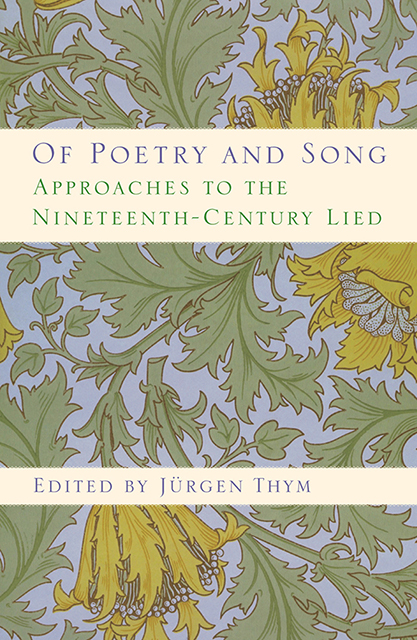Chapter Eleven - Hugo Wolf and Goethe’s “Duodrama”: Toward a “Better Understanding” of the Problematic Divan-Trinity of Life, Love, and Spirit
Published online by Cambridge University Press: 02 March 2023
Summary
Goethe's West-östlicher Divan contains within the vast range of its 250-odd poems numerous lyrics generally considered among the world's great love poetry. The majority are monologues in which the persona-lover not only implies reciprocity of feeling but also presupposes its potential existence. Some of the poems— although neither dialogues nor miniature dramas—juxtapose two personae, each addressing the other in a related context yet paradoxically expressing his or her amorous interdependence in autonomous poems. Goethe's term for this configuration, “duodrama,” occurs in the “Ankündigung im ‘Morgenblatt’ 1816,” and it is Hugo Wolf's singular contribution to the world's repertoire of Goethelieder to have set three such duodramas in a manner that takes their extraordinary duo-not-duet character into fullest consideration.
Because Goethe sensed a general need among readers of the Divan for additional information and consequently provided considerable cultural and historical commentary in “Noten und Abhandlungen zu besserem Verständnis des Divans,” an integral part of the West-östlicher Divan since its first publication in 1819, it seems far from heretical to suggest that musical settings of certain poems from the Divan might lead listeners as well as readers to a “better understanding” of the complexities inherent both in the texts themselves and in their cyclic interaction with one another. Whereas there are but nine duodramas as such in the entire West-östlicher Divan, it is significant that six of the seventeen Divan poems Hugo Wolf set to music constitute three central duodramas in the “Buch Suleika,” the largest sub-cycle in Goethe's collection of twelve such “books” of poems. Within the forty-eight poems of the “Buch Suleika,” to be sure, can be found a great diversity of style and content, a good deal of which would seem to lie well outside the range within which musical renderings can offer interpretive insight. It is thus all the more striking that within this body of heterogeneous love poetry Wolf should have focused his compositional attention on those poems that contain the key words or concepts of Goethe's fascinating endeavor to capture—in poetry—the essence of “life,” “love,” and “spirit.” Although all three of these terms find combined and climactic expression in the final couplet of the third duodrama, “Denn das Leben ist die Liebe, / Und des Lebens Leben Geist,” two of them function explicitly or implicitly in the other duodramas as well.
- Type
- Chapter
- Information
- Of Poetry and SongApproaches to the Nineteenth-Century Lied, pp. 283 - 321Publisher: Boydell & BrewerPrint publication year: 2010



